Diplomatic Bluebook 2025
Chapter 3
Japan's Foreign Policy to Promote National and Global Interests
2 Efforts to expand the free and fair economic order
(1) Promotion of Economic Partnerships
In recent years, despite the advancement of economic globalism, the global economy continues to be in turmoil due to factors such as more pronounced protectionist movements, Russia's aggression against Ukraine, and the situation in Israel and Palestine. In such circumstances, Japan has emphasized and steadily promoted Economic Partnership Agreements (EPAs) and Free Trade Agreements (FTAs), which help capture the vitality of the growing market overseas and strengthen the basis of the Japanese economy through measures such as the reduction or elimination of tariffs on goods as well as barriers on trade in services, and through rule-making for trade and investment.
Regarding bilateral Economic Partnership Agreements, the decision was made to launch negotiations on a Japan-Bangladesh EPA in March, with negotiation rounds held in May, November, and December. In September, the decision was made to launch negotiations on an EPA between Japan and the United Arab Emirates (UAE), and the first round of negotiations was held in November. Regarding the Japan-Gulf Cooperation Council (GCC)(1) EPA, while negotiations had been suspended since 2009, a decision was later made with the GCC side to resume negotiations and the first round of negotiations was held in December. Regarding the Japan-Indonesia EPA, the Protocol amending the Agreement was signed in August. Concerning the CPTPP, at the eighth meeting of the TPP Commission, held in November, the decision was made to establish an Accession Working Group (AWG) for Costa Rica, and in December the Protocol on the Accession of the UK to the CPTPP entered into force for 10 countries, including Japan.
As of the end of 2024, Japan's EPA/FTA ratio (the proportion of trade volume with countries with which Japan has EPA or FTA that have already entered into force or been signed, to Japan's total trade volume) reached approximately 78.9% (source: 2025 Trade Statistics of Japan, Ministry of Finance). Japan will continue working actively to maintain the high standards of the CPTPP, ensure the transparent implementation of the Regional Comprehensive Economic Partnership (RCEP) Agreements, and negotiate other EPAs in order to expand the free and fair economic order that is the basis for its own peace and prosperity.
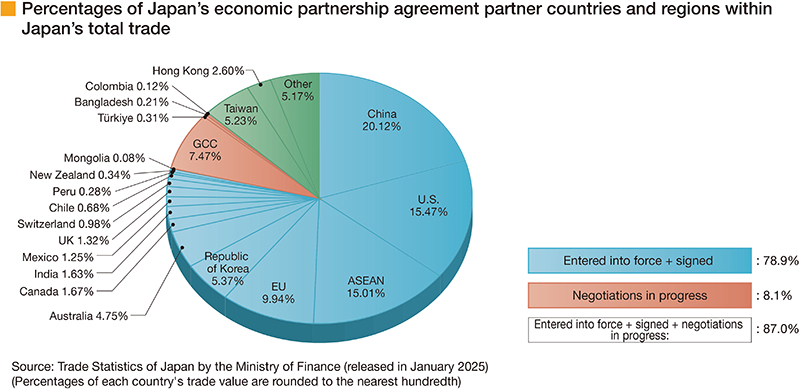
- (1) Gulf Cooperation Council (GCC): Established by Saudi Arabia, United Arab Emirates (UAE), Bahrain, Oman, Qatar, and Kuwait.
A Multilateral Agreements, etc.
(A) Comprehensive and Progressive Agreement for Trans-Pacific Partnership (CPTPP)
The CPTPP sets high-standard rules in a wide range of areas, including tariffs, services, investment, e-commerce, intellectual property, and state-owned enterprises. It also provides opportunities for Japanese companies to better thrive in overseas markets, giving it important economic significance as a major driving force for the country's economic growth. Furthermore, the CPTPP has great strategic significance in that it will establish a free and fair economic order with countries sharing fundamental values and principles, including freedom, democracy, fundamental human rights and the rule of law, and contribute significantly to the security of Japan and stability in the Indo-Pacific region, ensuring regional and global peace and prosperity.
The 12 countries of Japan, Australia, Brunei, Canada, Chile, Malaysia, Mexico, New Zealand, Peru, Singapore, the United States (U.S.), and Viet Nam signed the Trans-Pacific Partnership Agreement (TPP Agreement) in February 2016. However, due to the U.S.' announcement of its withdrawal from the TPP Agreement in January 2017, Japan proactively led discussions among the 11 countries for the early realization of the TPP. Agreement in principle was reached at the TPP Ministerial Meeting in November 2017, and the CPTPP was signed in Chile in March 2018. Six countries required for the entry into force of the agreement (Mexico, Japan, Singapore, New Zealand, Canada, and Australia) completed their domestic procedures and the agreement entered into force on December 30, 2018. The agreement entered into force for all 11 countries that signed it, with Viet Nam becoming a party in January 2019, Peru in September 2021, Malaysia in November 2022, Chile in February 2023, and Brunei in July 2023.
Since the CPTPP entered into force, eight CPTPP Commission meetings have been held mostly at the ministerial level. At the fourth meeting of the TPP Commission, held in June 2021, it was decided to commence the accession process of the UK, which had been formally requested in February of that year, and to establish an AWG for the UK. The working group started meeting in September of that year. In March 2023, the CPTPP members and the UK held a ministerial meeting in an online format to confirm the substantial conclusion of the negotiations for the accession of the UK to the CPTPP. In July of the same year, the meeting of the seventh CPTPP Commission was held in New Zealand, where the Protocol on the Accession of the UK to the CPTPP was signed. Based on the results of the negotiations, the Protocol sets out, among other things, the UK's compliance with the rules in each of the areas stipulated in the CPTPP and the market access commitments that the CPTPP Parties and the UK grant to each other. Japan approved the protocol at the 212th session of the Diet (extraordinary session) in December of the same year, and the protocol subsequently entered into force for 10 countries, including Japan, in December 2024. Furthermore, the eighth meeting of the TPP Commission was held in Canada in November of the same year, where it was decided to commence the accession process for Costa Rica, which had been formally requested in August 2022, and to establish an AWG for Costa Rica. In addition, future actions related to the “General Review” of the agreement were discussed. China requested to join the CPTPP on September 16, 2021; Taiwan on September 22, 2021; Ecuador on December 17, 2021; Uruguay on December 1, 2021; Ukraine in May 2023; and Indonesia in September 2024. Japan will properly assess whether the economies that have requested membership are fully capable of meeting the high standards of the CPTPP and have the intention and ability to continue to do so in their post-accession implementation, while also taking into account strategic perspectives and the understanding of the public.
(B) Indo-Pacific Economic Framework for Prosperity (IPEF)
The IPEF is a framework for discussing economic cooperation in the Indo-Pacific region and includes 14 countries: Australia, Brunei, Fiji, India, Indonesia, Japan, Malaysia, New Zealand, the Philippines, the Republic of Korea (ROK), Singapore, Thailand, the U.S., and Viet Nam. The launch was announced in Tokyo in May 2022 to coincide with U.S. President Joseph Biden's visit to Japan, and the four pillars of Trade, Supply Chains, Clean Economy, and Fair Economy were agreed upon for subjects of negotiations at the IPEF Ministerial in Los Angeles, U.S. in September of the same year.
The IPEF Supply Chain Agreement entered into force on February 24, 2024. Following an online IPEF Ministerial Meeting in March of the same year, an IPEF Ministerial Meeting and Investor Forum were held in Singapore in June. At the Singapore meeting, a signing ceremony was held for the IPEF Clean Economy Agreement, the IPEF Fair Economy Agreement and the IPEF Agreement, and the current status and future efforts regarding the implementation of the IPEF Supply Chain Agreement were discussed. In addition, an investor forum was held that aimed to promote business matching among private companies and institutional investors in order to attract investment in sustainable infrastructure and climate change technologies. At the forum, panel discussions were held on the clean economy in the Indo-Pacific region, with participation from ministers of IPEF partner countries, as well as public lenders and government agencies, multilateral development banks , institutional investors, and private company representatives. In addition, an IPEF Ministerial Meeting was held online in September, the IPEF Clean Economy Agreement and IPEF Agreement entered into force on October 11, and the IPEF Fair Economy Agreement entered into force on October 12.
Japan will continue to work with other partner countries to contribute to cooperation, stability, prosperity, development, and peace in the Indo-Pacific region.
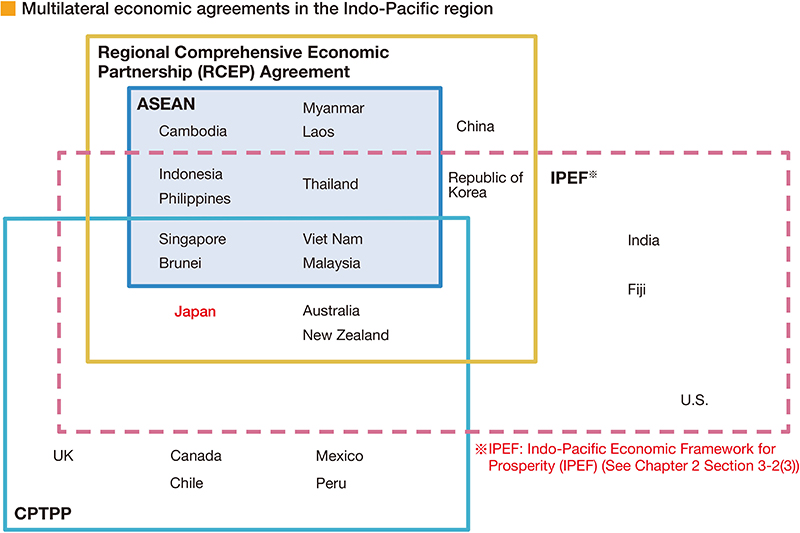
(C) Japan-EU Economic Partnership Agreement (Japan-EU EPA)
In February 2019, the Japan-EU EPA, which at the time accounted for about 30% of global GDP and 40% of global trade, entered into force. The EU is an important partner for Japan, being its third largest export partner (10.3% of total exports) and third largest import partner (10.3%) (both as of 2023).
In July 2024, ministers held the Fifth Meeting of the Japan-EU EPA Joint Committee, where they welcomed the steady implementation of the Japan-EU EPA in various fields as it marks its fifth anniversary since its entry into force, and exchanged views on progress in areas such as sanitary and phytosanitary measures (SPS), geographical indications (GI), government procurement, regulatory cooperation, and trade and sustainable development. Also, on the 1st of the same month, the Protocol Amending the Japan-EU EPA to include “provisions on the free flow of data” entered into force. The Government of Japan will continue to closely cooperate on further deepening the Japan-EU economic relationship by promoting efforts to ensure effective implementation of the EPA through minister-level meetings of the Joint Committee and specialized committees and working groups.
(D) Japan-UK Comprehensive Economic Partnership Agreement (Japan-UK CEPA)
The Japan-UK EPA, which entered into force in January 2021 after the UK left the EU, is an important cornerstone for further deepening economic relations between Japan and the UK as global strategic partners who share fundamental values. The Japan-UK EPA, based on the Japan-EU EPA and comprising 24 chapters in total, stipulates rules that are more advanced and high-level than those of the Japan-EU EPA in such areas as electronic commerce and financial services. In addition, it is the first EPA concluded by Japan to include a chapter on promoting women's access to the opportunities and benefits created by trade, and with the cooperation of the Japanese and the UK governments, the Japan-UK Women's Economic Empowerment Seminar was held in July.
The Government of Japan will continue to promote efforts to ensure effective implementation of the EPA through minister-level meetings of the Joint Committee and specialized committees and working groups, and will continue to cooperate closely to further deepen economic relations between Japan and the UK.
(E) Japan-GCC Economic Partnership Agreement (EPA)
The conclusion of the EPA with the Gulf Cooperation Council (GCC) is important not only for the improvement of the business environment through tariff reductions and established rules, but also in the interest of energy security.
EPA negotiations between Japan and the GCC began in 2006 and were then suspended in 2009. However, when Prime Minister Kishida visited Saudi Arabia in July 2023, he and GCC Secretary General Jasem Al Budaiwi concurred to resume negotiations in 2024, and the first round of negotiations after the resumption was held in Riyadh, Saudi Arabia in December 2024.
The Japan-GCC EPA is expected to provide strong support to the socio-economic reforms being promoted in the GCC countries toward industrial diversification and reduction of dependence on oil, and to contribute to further strengthening relations between Japan and the GCC.
(F) Regional Comprehensive Economic Partnership (RCEP) Agreement
The RCEP is an economic partnership agreement involving the members of the Association of Southeast Asian Nations (ASEAN), Japan, Australia, China, the ROK, and New Zealand. RCEP participating countries account for roughly 30% of the world's total GDP, total trade value, and population. The entry into force of the Agreement is expected to further strengthen Japan's ties with the regions serving as the world's growth center, thus contributing to the economic growth of Japan. Following a ceremony to launch RCEP negotiations during the ASEAN-related summit meetings held in Phnom Penh, Cambodia, in November 2012, there were eight years of negotiations that included four summit meetings, 19 ministerial meetings, and 31 rounds of negotiations. The Agreement was signed on the occasion of the fourth RCEP Summit on November 15, 2020.
The RCEP Agreement entered into force on January 1, 2022, and a total of eight Joint Committee meetings and three Ministers' Meetings were held by the end of 2024. Japan, for its part, will work in close cooperation with the countries concerned to ensure that economic activities based on free and fair rules take root in the region by ensuring the transparent implementation of the RCEP Agreement.
(G) Free Trade Area of the Asia-Pacific (FTAAP)
The APEC Putrajaya Vision 2040 (adopted in 2020), which outlines the medium- to long-term direction of Asia-Pacific Economic Cooperation (APEC), states that APEC “will advance economic integration in the region in a manner that is market-driven, including through the work on the Free Trade Area of the Asia-Pacific (FTAAP) agenda.” A FTAAP agenda Work Plan was formulated in 2022, and work is underway to materialize this agenda.
Japan has contributed to sharing knowledge and supporting capacity building on the FTAAP agenda by holding workshops on the “competition chapters” in EPAs and competition policy.
At the APEC Leaders' Meeting in Peru in 2024, the “Ichma(2) Statement on A New Look at the Free Trade Area of the Asia-Pacific agenda” was adopted, reaffirming that promoting market-driven economic integration is APEC's primary objective and that APEC will support the progress of the FTAAP agenda. The statement also clearly states that new programs will be launched to examine areas such as customs procedures, investment facilitation, digital trade, competition policy, state-owned enterprises, and labor, taking into account existing free trade agreements.
- (2) Ichma: name of a place in an ancient Peruvian civilization
B Bilateral Agreements
(A) Japan-Türkiye Economic Partnership Agreement (EPA)
As an important country that serves as a hub among Europe, the Middle East, the Central Asia and Caucasus region, and Africa, Türkiye has considerable economic potential and is attracting attention as a production base for exports to surrounding regions. Amid high expectations from the business communities of both countries for the early conclusion of a Japan-Türkiye EPA, the two countries confirmed to launch negotiations at the Japan-Türkiye Summit Meeting in January 2014, and 17 rounds of negotiations have been held as of December 2024. Türkiye has concluded EPAs or FTAs with more than 20 countries and regions to date, and it is expected that the conclusion of this EPA will facilitate stronger competitiveness for Japanese companies.
(B) Japan-Bangladesh Economic Partnership Agreement (EPA)
Bangladesh has traditionally been a friendly country to Japan, and the two countries have fostered good relations through primarily economic cooperation. In April 2023, the relationship between the two countries was elevated to a “Strategic Partnership,” and economic relations between the two countries have further developed in recent years. In light of this situation, the decision was made to launch Japan-Bangladesh EPA negotiations in March 2024, with the aim of expanding trade between the two countries and improving the investment environment by establishing rules. The first round of negotiations was held in May 2024, and the second and third rounds in November and December.
The conclusion of the Japan-Bangladesh EPA is expected to foster even stronger economic relations between the two countries, as well as contribute to realizing a “Free and Open Indo-Pacific (FOIP)” and to further elevating Japan's presence in South Asia.
(C) Japan-United Arab Emirates (UAE) Economic Partnership Agreement (EPA)
The UAE is an important strategic partner for Japan in terms of energy security, and in recent years the two countries have been promoting cooperation in a wide range of fields under the framework of the Comprehensive Strategic Partnership Initiative (CSPI).
In September, the two countries decided to launch negotiations for a Japan-UAE EPA, and the first round of negotiations was held in November. The conclusion of the EPA between Japan and the UAE, in addition to the Japan-GCC EPA being negotiated in parallel, is expected to contribute to further strengthening economic relations between the two countries, including expansion of trade and investment.
C Other EPAs that have Entered into Force
The existing EPAs contain provisions concerning the joint committee, which is a body that discusses the implementation of the agreements, and a process to review the agreements after a certain period of time following their entry into force. In addition, a variety of consultations are being held in order to smoothly implement the EPAs after their entry into force. Regarding the Japan-Indonesia EPA, at the Japan-Indonesia Summit Meeting held in December 2023, it was confirmed that negotiations for the Protocol Amending the Agreement between Japan and the Republic of Indonesia for an Economic Partnership had been substantially concluded. The Protocol was signed in August 2024.
In accordance with the EPAs, the Government of Japan has been accepting candidates for nurses and certified care workers from Indonesia, the Philippines, and Viet Nam. In total, 4,259 (as of FY2024) candidates have been accepted from Indonesia, 3,837 from the Philippines, and 1,944 from Viet Nam. From these three countries, the total number of nurses and certified care workers who have passed national exams is 666 and 3,118 individuals, respectively, as of FY2023.
D Investment-related Agreements
Investment-related agreements (Investment agreement and EPA/FTA including investment chapter) constitute an important legal basis to improve predictability for investors and promote their investment activities by establishing common rules for the protection of investors and their investment assets, enhancement of transparency in regulations, expansion of investment opportunities, procedures for investment dispute settlement, and other matters. Japan has actively engaged in concluding investment-related agreements, as these agreements are considered to improve the investment environment for Japanese companies overseas as well as to attract foreign investment to the Japanese market.
In February 2024, the decision was made to launch negotiations to amend the Japan-Ukraine Investment Agreement, and in July, a decision was made to launch negotiations on a Japan-Serbia Investment Agreement. That same month, the Japan-Angola Investment Agreement entered into force, and in December, the decision was made to launch negotiations on the Japan-Tunisia Investment Agreement. In February 2025, the Japan-Zambia Investment Agreement was signed. As of the end of February 2025, 54 investment-related agreements have entered into force (37 investment agreements and 17 EPAs), and three investment-related agreements have been signed but have not yet entered into force (two investment agreements and one EPA). Altogether, there will be 57 investment-related agreements covering 82 countries and regions. Including investment-related agreements that are currently under negotiation, these investment-related agreements will cover 96 countries/regions and approximately 95% of Japan's outbound direct foreign investment.(3)
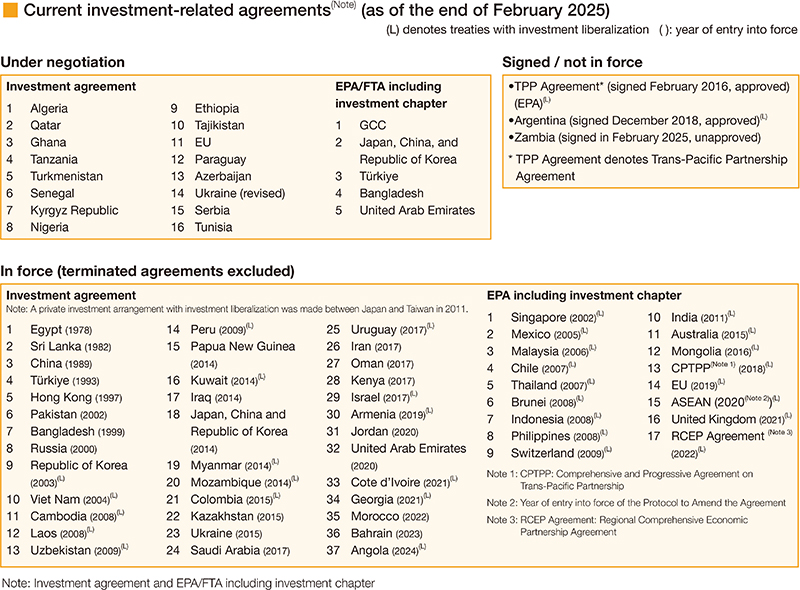
- (3) “Regional balance of Direct Investment (Assets),” Ministry of Finance (All regions) (As of the end of 2023)
E Tax Conventions/Agreements on Social Security
(A) Tax Conventions
Tax conventions are intended to eliminate international double taxation in cross-border economic activities (e.g., to reduce or exempt withholding taxes imposed on investment income such as dividends), and to prevent tax evasion and avoidance, and provide an important legal basis for promoting sound investment and economic exchange between two countries. To support the sound overseas business expansion of Japanese companies, the Government of Japan is working to expand the necessary tax treaty network.
Entering into force in 2024 were a tax treaty with Algeria in January and a tax treaty with Greece in December. New (fully revised) tax treaties with Ukraine (February), Turkmenistan (December), and Armenia were also signed. As of December 2024, Japan has concluded 87 tax treaties applied to 155 economies.
(B) Agreements on Social Security
Agreements on social security aim to resolve the issues of the double payment of social security insurance premiums and pension entitlement. They are expected to facilitate interpersonal exchange and strengthen further bilateral relations, including economic exchange, by reducing the burden on Japanese companies and citizens working overseas. The total number of countries that have concluded or signed such agreements with Japan now stands at 24 as of December 2024.
(2) Initiatives with International Organizations
A World Trade Organization (WTO)
(A) Challenges Facing the WTO and WTO Reform
The WTO has contributed to the economic growth of Japan and the world as the foundation of a rules-based, free and open multilateral trading system. The world is currently facing a number of geopolitical challenges, as well as changes in the global economy such as the development of digital trade and new challenges such as non-market policies and practices and economic coercion. It is undeniable that the WTO has not been able to adequately address these crises and challenges, and the need for WTO reform has never been more urgent if the multilateral trading system, with the WTO as its core, is to be maintained and strengthened.
Against this backdrop, Japan is promoting international efforts to reform the WTO, which consist of the three pillars: (1) formulating rules in line with the times, (2) reforming the dispute settlement system, and (3) strengthening the function for monitoring and implementation of the WTO Agreements.
(B) 13th WTO Ministerial Conference (MC13)
The 13th Ministerial Conference (MC13) of the World Trade Organization (WTO) was held in Abu Dhabi, UAE from February 26 to March 2. At MC13, in light of the new challenges facing the global economy, discussions were held on the role of the WTO as the cornerstone of the international trading order and the direction of future efforts. Participating as a representative of MOFA, State Minister for Foreign Affairs TSUJI Kiyoto held bilateral meetings with WTO Director-General Ngozi Okonjo-Iweala and representatives from each country in an effort to coordinate opinions toward M13 outcomes.
As concrete outcomes of MC13, the ministers confirmed the progress made so far regarding WTO reform and shared the intention to continue to ceaselessly promote reform in the future. With regard to reforming the dispute settlement system, the ministers concurred to accelerate discussions with the views to having a fully and well-functioning dispute settlement system accessible to all WTO Members by 2024. In addition, it was decided that the moratorium on the imposition of customs duties on electronic transmissions, which has been continuously extended at the WTO since 1998, will be extended until the next Ministerial Conference (MC14)(4) in March 2026. In addition, at MC13, the accession procedures for Comoros and Timor-Leste were completed.(5) As an outcome of MC13, a Ministerial Declaration that confirmed these achievements was adopted.
Since the WTO bases its decisions on consensus, MC13 was unable to reach a consensus on topics where agreement was initially expected due to opposition from some members, and no results were achieved. This once again highlighted the difficulty of achieving results within the WTO given the increasing diversity of its membership.
- (4) The 14th Ministerial Meeting is scheduled to be held from March 26 to 29, 2026.
- (5) Comoros and Timor-Leste formally joined the WTO on August 21 and August 30, respectively.
(C) Formulation of rules in line with the times
The Agreement on Fisheries Subsidies, adopted at the 12th WTO Ministerial Conference (MC12) in June 2022, aims to ensure the sustainable use of living marine resources by, among other things, prohibiting subsidies that lead to illegal, unreported, and unregulated (IUU) fishing. Japan, which has already accepted the agreement, is persistently reaching out to members that have not yet accepted it to gain acceptance by two-thirds of all members as necessary for the agreement to enter into force. Japan is also engaged constructively in discussions toward an early conclusion of “second wave” negotiations on the agreement, which aims to achieve a comprehensive agreement on fisheries subsidies.
In addition to rule-making by all WTO members, such as the Agreement on Fisheries Subsidies, Japan has been promoting Joint Statement Initiatives (JSIs)(6) as a new initiative for rule-making by like-minded members. The JSIs cover three main areas: investment facilitation, e-commerce, and services domestic regulation. Regarding investment facilitation, at MC13, Japan declared the conclusion of negotiations on the “Agreement on Investment Facilitation for Development,” and subsequently called on other members to incorporate the agreement as an annex to the WTO Agreement. Regarding e-commerce, Japan, together with Australia and Singapore, led the discussions as a co-convenor and contributed to the publication of the text of the “Agreement on Electronic Commerce” in July 2024. In addition, with regard to the new disciplines on services domestic regulation, for which the negotiation among like-minded members was concluded in December 2021, the WTO procedures to incorporate the new disciplines as additional commitments to the schedules of respective participating members were concluded in February 2024, resulting in a concrete achievement of rule-making by the like-minded at the WTO.
- (6) The Joint Statement Initiatives refer to initiatives based on a joint statement issued by plurilateral like-minded members. They were adopted at the 11th WTO Ministerial Conference in December 2017 and mainly include initiatives on (a) services domestic regulation, (b) e-commerce, and (c) investment facilitation.
(D) Dispute Settlement
The WTO dispute settlement system is aimed at seeking a rules-based settlement of economic disputes arising between WTO Members, whereby providing security and predictability to the multilateral trading system. Since December 2019, the Appellate Body (serving as the final instance) has “ceased to function” due to a failure to (re)appoint its members, falling short of the quorum required to hear an appeal, but the dispute settlement system itself continues to be used by WTO Members. In March 2023, Japan joined the Multi-Party Interim Appeal Arbitration Arrangement (MPIA), which was launched by like-minded countries in 2020 as a framework to temporarily replace the functions of the Appellate Body, and has continued to actively participate in discussions on reform of the dispute settlement system even after joining the MPIA.
As of December 31, 2024, four cases to which Japan was one of the parties to the dispute had been brought to the WTO's dispute settlement mechanism, with the following developments in 2024.
In the case of Japan's complaint filed in 2021 against China's anti-dumping measures on Japanese stainless steel products, a panel report was circulated to all WTO Members in June 2023. It concluded that the measures in question were inconsistent with the Anti-Dumping Agreement, recommending China to bring the measures into conformity with its obligations under that agreement. The panel report was adopted by the WTO Dispute Settlement Body (DSB) in July. In October, Japan and China shared an intention to set the reasonable period of time for China to implement the recommendations and rulings by May 8, 2024. China subsequently conducted a reinvestigation to implement the DSB's recommendations and announced in May 2024 that it would continue to maintain the measures. In July, China announced the launch of a sunset review of the measures (an investigation into the need to continue the anti-dumping measures); however, the stainless steel products at issue from Japan were not subject to the review, and the anti-dumping measures against Japan in this dispute were terminated.
B Organisation for Economic Co-operation and Development (OECD)
(A) Features
The OECD is an international organization with 38 member countries with shared values for the purpose of economic growth, development assistance, and the expansion of free, multilateral trade. The OECD conducts research and analysis on a wide range of economic and social areas and makes specific policy recommendations. Through discussions held by approximately 30 committees, it has formed international standards and rules. Since its accession to the OECD in 1964, Japan has been actively engaged in OECD initiatives through discussions at various committees as well as financial and human resources contributions.
(B) 2024 OECD Ministerial Council Meeting
The 2024 Ministerial Council Meeting, chaired by Japan for the first time in 10 years to mark the 60th anniversary of its accession to the OECD, was held in Paris, France on May 2 and 3. The meeting was held under the theme of “Co-creating the Flow of Change,” and six ministers attended from Japan, including Prime Minister Kishida and Foreign Minister Kamikawa.
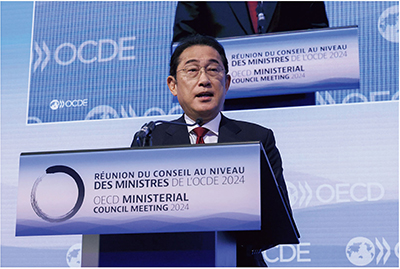 Prime Minister Kishida delivering the Chair's keynote speech at the opening ceremony of the OECD Ministerial Council Meeting (May 2, Paris, France; Photo: Official Website of the Prime Minister of Japan and His Cabinet)
Prime Minister Kishida delivering the Chair's keynote speech at the opening ceremony of the OECD Ministerial Council Meeting (May 2, Paris, France; Photo: Official Website of the Prime Minister of Japan and His Cabinet)In his keynote speech as chair, Prime Minister Kishida emphasized the importance of uniting under the spirit of “Co-creating the Flow of Change” to overcome the crises facing the international community, as the global economy faces risks such as inflation and disruptions in energy and food supplies as well as fragmentation in global supply chains. He also noted that 60 years have passed since Japan joined the OECD, and that as the international community faces multipolarity, division, and conflict, it is important for the OECD, which is made up of member countries with shared values, to reach out to non-member countries in various regions around the world, including Southeast Asia.
(C) Initiatives in Various Sectors
The OECD plays an important role in shaping rules and standards in the economic and social spheres, as well as in promoting these rules and standards in emerging economies through deepening cooperation with other international fora such as the G20, G7, and APEC. Its initiatives include leading discussions on reviewing the international taxation system, revising principles on AI and corporate governance, disseminating and implementing the G20 Principles for Quality Infrastructure Investment,(7) and engaging in aid coordination.
- (7) Endorsed at the G20 Osaka Summit in June 2019, the Principles for Quality Infrastructure Investment include elements such as openness, transparency, economic efficiency, and debt sustainability.
(D) Outreach to Southeast Asia
With the growing significance of the Indo-Pacific region in the global economy, it is an important task for the OECD to strengthen relations with Indonesia and other emerging economies in Southeast Asia and to promote the OECD's rules and norms. In this context, the OECD has been working to strengthen its ties with the region through policy dialogues, including through the Southeast Asia Regional Programme (SEARP). Concrete results include the decision in February to begin the OECD accession process for Indonesia, the first country from Southeast Asia, and the decision in June to begin the accession process for Thailand.
At the 2024 Ministerial Council Meeting, a ceremony commemorating the 10th anniversary of SEARP was held, in which Prime Minister Kishida announced the launch of the Japan OECD-ASEAN Partnership Program (JOAPP) in order to leverage the OECD's strengths in reliable data and analysis for sustainable growth in Southeast Asia.
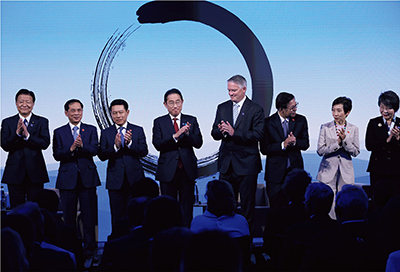 Prime Minister Kishida attending the ceremony to commemorate the 10th anniversary of the OECD Southeast Asia Regional Programme (May 2, Paris, France; Photo: Official Website of the Prime Minister of Japan and His Cabinet)
Prime Minister Kishida attending the ceremony to commemorate the 10th anniversary of the OECD Southeast Asia Regional Programme (May 2, Paris, France; Photo: Official Website of the Prime Minister of Japan and His Cabinet)Japan will continue to encourage future OECD membership from the Southeast Asian region, utilizing the OECD Tokyo Centre and the technical cooperation of Japan International Cooperation Agency (JICA).
(E) Contributions in Terms of Financial and Human Resources
As of 2024, Japan was the second largest financial contributor to the OECD, covering 8.5 % of the OECD's mandatory contributions (the U.S. is first, covering 18.3 %). Moreover, Japanese nationals have successfully served as one of the Deputy Secretary-Generals (including the incumbent Deputy Secretary-General, TAKEUCHI Yoshiki), and 88 Japanese staff work at the OECD Secretariat as of the end of 2023.
(3) Intellectual Property Protection
Strengthening the protection of intellectual property is crucial to promoting technological innovation and, through it, achieving economic growth. Japan is contributing to advancing multilateral discussions and the strengthening of international collaboration at APEC, the WTO (TRIPS),(8) and the World Intellectual Property Organization (WIPO). In addition, Japan is working to improve an environment for ensuring that Japanese intellectual property is appropriately protected and utilized both domestically and internationally through means such as establishing provisions for the protection and promotion of the use of intellectual property in economic partnership agreements that include the CPTPP, RCEP Agreement, Japan-EU EPA, and Japan-UK EPA.
At the same time, in order to provide prompt and effective support to Japanese companies facing increasingly serious intellectual property issues such as counterfeit and pirated products, MOFA has appointed Intellectual Propery Officers at almost all diplomatic establishments overseas, and is collecting information, considering countermeasures, and lobbying the authorities of the countries concerned to ensure appropriate actions are taken. MOFA is also holding meetings with the aim of strengthening the capacities of these officers, and is working to strengthen the response systems of diplomatic missions overseas by exchanging intellectual property-related information in each country and region, as well as sharing experience and knowledge on responding to infringement cases faced by Japanese companies. In 2024, meetings were held in Southeast Asia, Latin America, and the Middle East and North Africa.
- (8) TRIPS Agreement: Agreement on Trade-Related Aspects of Intellectual Property Rights
■Behind the Scenes of the OECD Ministerial Council Meeting
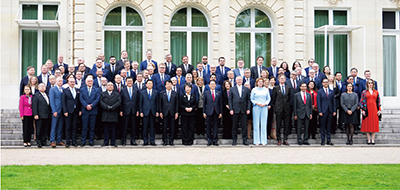 Photo from the 2024 OECD Ministerial Council Meeting (May 2, Paris, France)
Photo from the 2024 OECD Ministerial Council Meeting (May 2, Paris, France)What comes to mind when you hear the year 1964? This was a year marked by many historic moments that include the Tokyo Olympics, the opening of the Tokaido Shinkansen, and OH Sadaharu's 55 home runs. That same year, Japan joined the Organisation for Economic Co-operation and Development (OECD). In 2024, the 60th anniversary of Japan's accession to the OECD, Japan chaired the OECD Ministerial Council Meeting held in Paris, leading discussions and adopting a Ministerial Council Statement under the theme of “Co-Creating the Flow of Change: Leading Global Discussions with Objective and Reliable Approaches towards Sustainable and Inclusive Growth.” This column highlights the significance and outcomes of the meetings Japan held with various countries behind the scenes of these high-profile achievements.
■The Significance of Bilateral Meetings in Multilateral Meetings
Did you know that many bilateral meetings take place on the sidelines of multilateral meetings? In the world of diplomacy, opportunities for bilateral meetings that take place between such multilateral meetings are called “margins.” Just as it is said that in the world of art that true masters value empty space, the same is true in the world of diplomacy. Bilateral meetings in such fora can at times lead to highly significant diplomatic outcomes for both countries.
For example, in 2019, relations between the United States (U.S.) and China had been increasingly tense with both countries implementing retaliatory tariffs on each other. Amidst this, at the U.S.-China Summit Meeting held on the margins of the G20 Buenos Aires Summit, both countries shared the view on temporarily suspending further tariff measures and holding more discussions.
■Outcomes of Bilateral Meetings at the 2024 Ministerial Council Meeting
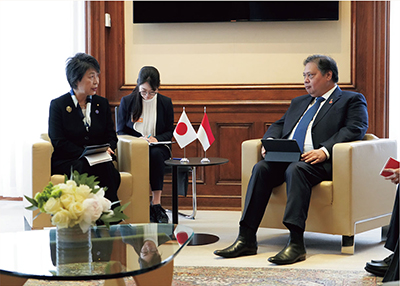 Meeting between Foreign Minister Kamikawa and Indonesia's Coordinating Minister for Economic Affairs Airlangga (May 2, Paris, France)
Meeting between Foreign Minister Kamikawa and Indonesia's Coordinating Minister for Economic Affairs Airlangga (May 2, Paris, France)The 2024 Ministerial Council Meeting, chaired by Japan, was attended by OECD member countries, as well as accession candidate countries, Key Partner countries, and officials from international organizations, and Japan held bilateral meetings with various countries on the margins. These included meaningful discussions between Foreign Minister Kamikawa and her counterparts in the U.S., Mexico, Indonesia, and Viet Nam. The OECD was also on the agenda for these meetings as they took place on the margins of the OECD Ministerial Council Meeting. With regard to outreach1 to Southeast Asian countries, for example, Foreign Minister Kamikawa held a meeting with Indonesia's Coordinating Minister for Economic Affairs Airlangga Hartarto where the two ministers welcomed the adoption of the OECD's accession roadmap for Indonesia and agreed to continue cooperating in a wide range of economic affairs. In a meeting with U.S. Deputy Secretary of State Kurt M. Campbell, both sides shared the significance that the Southeast Asian countries' accession process to the OECD needs to proceed in an open, transparent, and swift manner.
Such bilateral meetings held on the margins of the Ministerial Council Meeting not only contributed to strengthening bilateral relations but also proved fruitful in terms of the OECD's outreach activities to Southeast Asia.
■Summary
This column explored examples of how bilateral meetings between Japan and other countries held on the margins of the 2024 OECD Ministerial Council Meeting also led to multilateral diplomatic outcomes at the OECD. Many bilateral meetings take place at multilateral conferences, and each bilateral meeting always has some kind of intention or purpose. By thinking about the context behind such meetings, you may deepen your understanding of diplomacy and find it more fascinating than you expected.
- 1 Outreach: In this context, the OECD cooperates with member countries to promote the dissemination of OECD standards to non-OECD member countries, and works together in the preparation of various policy analysis reports and the hosting of international conferences.

